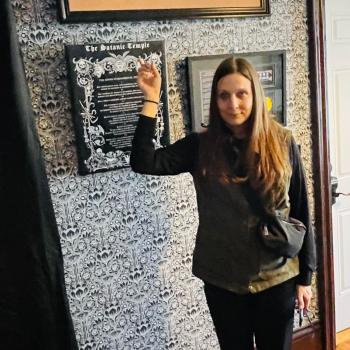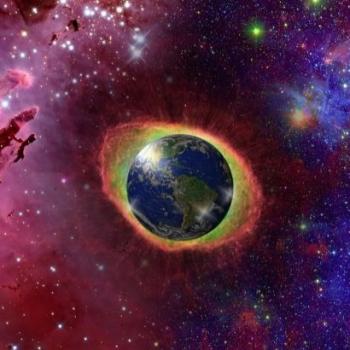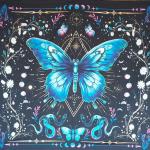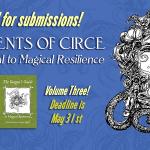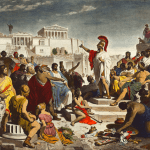In a recent blog about the conversion of one of Patheos’s bloggers, Lise (hey, Lise! Mazel tov!), from atheism to Catholicism, Star raised a question of whether that might happen for other bloggers writing for this enterprise as well. I think it probably will, because conversion-type experiences happen far more frequently for people who are seriously interested in religious matters than for people who aren’t. Such experiences can differ in a huge variety of ways. What they have in common is that they always mark some sort of spiritual progress for that person. It is irrelevant whether anyone else can perceive that change to be progress or not.
Thinking about this issue, I find that I’ve had at least five different experiences in my life that can reasonably be classified as a type of conversion, and perhaps there may be yet another. The first was the “struck by lightning” experience that I had at age 14 and that I described in my second blog on here. The next was at age 23; it was a series of spontaneous altered states that were spread over several weeks. One of these was another ecstatic, in touch with the divine moment; others were not much fun; and overall it was not a conversion from one sort of belief system to another. Rather, it gave me an experience of and insights into how the human mind actually works. I have sorting out and building on the implications of what I thus learned ever since.
A third was the long process by which I became involved with the Craft. It began with my discovery of the myth of Aradia, just after that experience at age 14, and continued with the discovery of more books about matters relevant to the Craft on into the late 1960s, when my friends and I created the New Reformed Orthodox Order of the Golden Dawn. I have documented that creation in my Hippie Commie Beatnik Witches, which is available now on Amazon and Kindle, after many years of arguing with publishers who were far more interested in money than in anything else.
The next transformation was in the mid-1970s, when I began the process of getting sober in AA. That process was thoroughly interwoven with the process of becoming a practicing Catholic again, partly because I needed an adequate spiritual discipline to solidify and maintain my sobriety, partly because there were adult issues about religion that had not been resolved when I got blown sideways out of Catholicism as a teenager. Further, all of that was interwoven with the process of earning a Ph.D., which involves at least as much personal transformation as any other type of transmogrification. Ten years later, in the mid-1980s, partly because my conscience was harassing me, and partly because of a serious illness, I became active in the Craft again, though not with the intensity of that first decade. And more recently I’ve been through another sort of conversion, one that I am still evaluating.
One danger of the struck-by-lightning sort of experience is that it tends to give one the impression that one is now privy to all the True Secrets of the Universe. It often takes some difficult times to convince the experiencer that such is not at all a valid way to understand what has happened. One also tends to think that everyone else needs to have that sort of incredibly intense experience as well, in order to be genuinely enlightened or saved or whatever; that too is an inadequate understanding.
In the very first college course I taught, on the Pauline Corpus to a class of adults in the Evening College of the University of San Francisco in 1979, I was trying to argue that the intense sort of experience was essential in order to arrive at an adult understanding of faith. One woman, in her thirties, with children, replied, “No, that’s not necessary. Suppose you want to remodel your house. You move everything out of one room, totally rebuild it, move stuff back in, and repeat with the next room. When you’re done, your house is completely transformed, and yet you have lived there the whole time.” I knew she was right. I’ve explained her insight in AA meetings as a way to understand what the Twelve Steps are intended to accomplish, and there have been people who appreciated learning that concept.
One element that led to the founding of AA was the moment when Carl Jung told Roland, a patient who was a hopeless alcoholic, that if he could undergo a religious conversion, that might enable him to stop drinking—but Jung did not know how to cause such a conversion to happen. (Neither does anyone else. I’ll return to that point.) When Roland returned to New York, he gave that information to Ebby (played by Gary Sinese in the wonderful film, “My Name is Bill W.”), who told it to Bill Wilson. Bill’s subsequent “mountaintop” experience in his hospital bed, as he recounts it in the AA Big Book, after which he never had to drink again, provides one of the best descriptions ever of the most intense form of the conversion experience.
Afterward, Bill was sure that having just such an experience was essential in order for one to stop drinking; so he went around trying to convince other alcoholics to have one, but met with no success at all, of course. It was until the historic moment when he met Doctor Bob and shared his story that the strange process of getting sober in AA began. All of that is why the Appendix in the AA Big Book specifies that most people’s conversion process in AA is of the “educational variety,” that is, of slowly rebuilding one room at a time.
The true importance of the Twelve Step programs is not limited to dealing only with alcohol or other drugs, but is that their discipline can be used to overcome any sort or addictive, life-threatening behavior. I have some other stories about related issues, such as one about a thoroughly underappreciated genius, Prince Peter Kropotkin, that I will tell later. I also have more to say about Jung and about how our minds work, about how we can be utterly transformed by a conversion experience in an instant, but this is enough for today. Keep coming back; it works if you work it.




